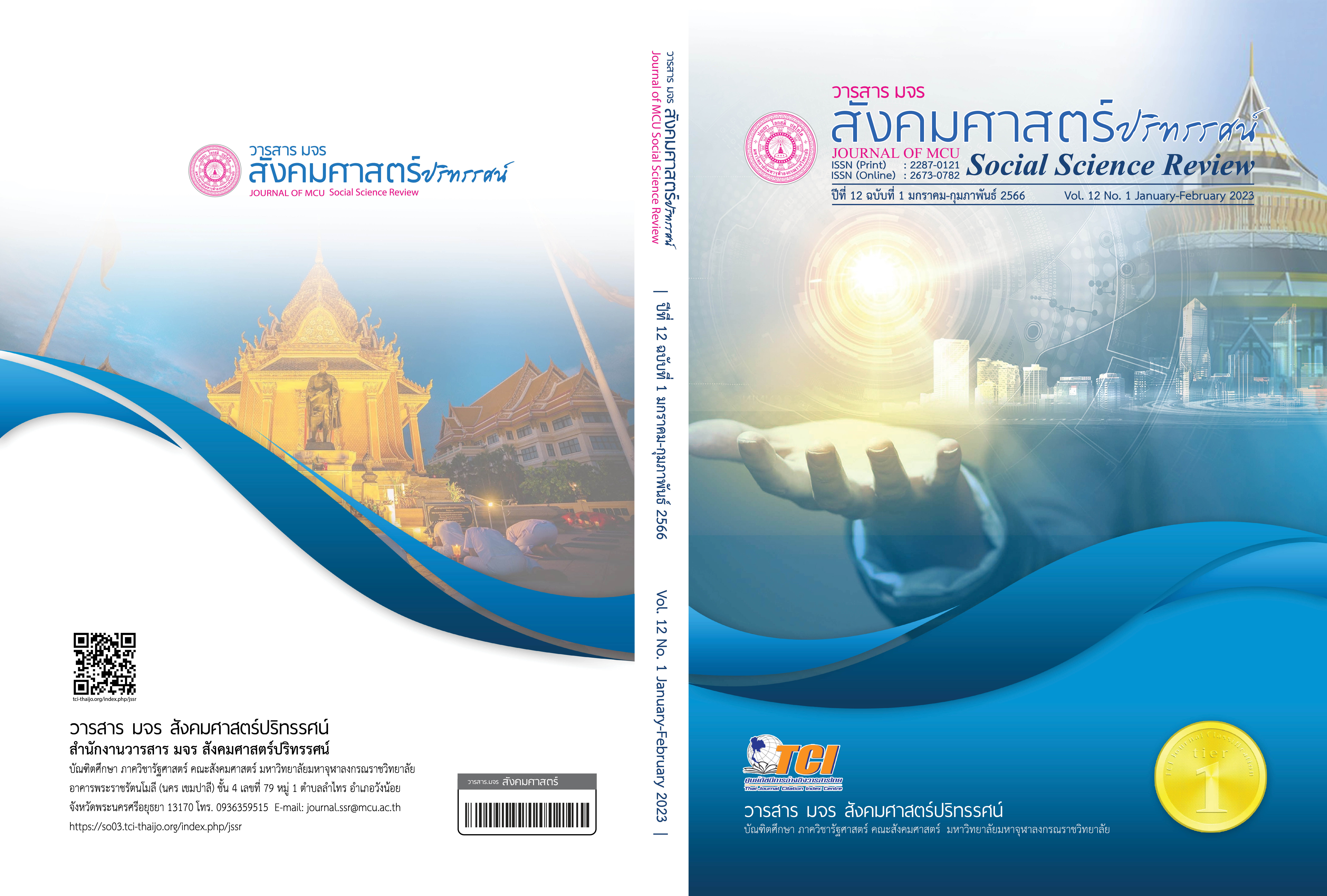ผู้นำกับพรหมวิหาร 4
คำสำคัญ:
พรหมวิหาร4, ผู้นำ, การบริหารบทคัดย่อ
บทความนี้มีจุดมุ่งหมายเพื่อสังเคราะห์แนวคิดทฤษฎีการนำเอาหลักพรหมวิหาร 4 มาประยุกต์ใช้กับองค์กรเพื่อให้เข้ากับผู้นำ การเป็นผู้นำที่ดีตามหลักธรรมคำสอนและผู้นำกับพรหมวิหาร 4 ที่พึ่งมีต่อลูกน้องและองค์กร โดยการจำแนกหลักพรหมวิหาร 4 ออกเป็นข้อ ๆ คือ เมตตา กรุณา มุทิตา อุเบกขา โดยแต่ละข้อจะสะท้อนในเห็นถึงตัวผู้นำ ผู้นำต้องเห็นความสำคัญของทุกคนในองค์กร ทั้งด้านหน้าที่การงาน การอยู่ร่วมกันอย่างสมานสันติในองค์กร โดยไม่แบ่งแยกฝ่ายใดฝ่ายหนึ่งหรือลำเอียงไปทางใดทางหนึ่งทุกคนต้องเสมอภาคต่อกัน การส่งเสริมการงาน ให้สำเร็จตามจุดมุ่งหมาย ดังนั้นการนำหลักพรหมวิหาร 4 เข้ามาประยุกต์ใช้กับผู้นำ ในการบริหารอำนาจ การรู้จักสิ่งที่ควรทำและไม่ควรทำ สิ่งที่ทำให้ผู้ที่อยู่ใต้บังคับบัญชาได้รับความเป็นธรรม ทำงานตามความสามารถที่เหมาะสมและในสิ่งที่ตนเองถนัด เพื่อให้ได้ทำงานที่ออกมามีประสิทธิภาพได้รับการชื่นชมและรางวัลตอบแทนเพื่อเป็นขวัญกำลังใจในการทำงานต่อไป
เอกสารอ้างอิง
กวี วงศ์พุฒ. (2535). ภาวะผู้นำ. กรุงเทพฯ: โรงพิมพ์พิเชษฐ์ สตูดิโอ
พระธรรมปิฎก (ป.อ. ปยุตฺโต). (2545). ภาวะผู้นํา: ความสำคัญต่อการพัฒนาคน พัฒนาประเทศ. กรุงเทพฯ: ธรรมสภา.
พิทูร มลิวัลย์. (2528). หลักธรรมสำหรับการปกครอง (พิมพ์ครั้งที่2). กรุงเทพฯ: โรงพิมพ์การศาสนา.
พระเทพโสภณ (ประยูร ธมฺมจิตฺโต). (2557). การปรับใช้หลักพุทธจริยธรรมเพื่อพัฒนาผู้บริหารสถานศึกษาขนาดเล็กให้การทำงานมีประสิทธิภาพ. (วิทยานิพนธ์พุทธศาสตรมหาบัณฑิต สาขาวิชาการพัฒนาสังคม). พระนครศรีอยุธยา: มหาวิทยาลัยมหาจุฬาลงกรณราชวิทยาลัย.
_______. (2548). พุทธวิธีบริหาร. กรุงเทพฯ: โรงพิมพ์วิน ดาต้าโปรดักส์.
ปิ่น มุทุกันต์. (2514). แนวการสอนธรรมตามหลักสูตรนักธรรม ชั้นตรี. กรุงเทพฯ: สํานักพิมพ์ คลังวิทยา.
พระจักรพงษ์ พลวโร. (2559). การบริหารงานตามหลักพรหมวิหารธรรมของ ผู้บริหารเทศบาลตำบลบ้านค่ายอำเภอบ้านค่าย จังหวัดระยอง (วิทยานิพนธ์พุทธ ศาสตรมหาบัณฑิต สาขาวิชาการพัฒนาสังคม). พระนครศรีอยุธยา: มหาวิทยาลัยมหาจุฬาลงกรณราชวิทยาลัย.
พระมหาบุญเรียน ปภงฺกโร (พิลาพันธ์). (2556). วิเคราะห์แนวความคิดเรื่องเมตตาในพุทธ ปรัชญาเถรวาท. (วิทยานิพนธ์พุทธศาสตรมหาบัณฑิต สาขาปรัชญา). พระนครศรีอยุธยา: มหาวิทยาลัยมหาจุฬาลงกรณราชวิทยาลัย.
พระมหาสุทธิชัย ฐิตชโย (ถาวรศิล). (2556). การนําหลักธรรมพรหมวิหาร 4 ไปใช้ในการ บริหารงานของผู้บริหารโรงเรียนพระปริยัติธรรม อำเภอเมือง จังหวัดร้อยเอ็ด. (วิทยานิพนธ์พุทธศาสตรมหาบัณฑิต.สาขาวิชาการพัฒนาสังคม). พระนครศรีอยุธยา: มหาวิทยาลัยมหาจุฬาลงกรณราชวิทยาลัย.
ศักดิ์ชัย ภู่เจริญ. (2552). ความหมายของภาวะผู้นำ. สืบค้น 16 ตุลาคม 2564, จาก http://www.kruinter.com/show.phpid_quiz=98&p=1&fbclid=IwAR0454sSPo9ahyIL7wUYg3881M1BYZOUR4PDcM-PTE7y0rx1mE—iTfXnHY
สมเด็จพระญาณสังวร สมเด็จพระสังฆราช (เจริญ สุวฑฺฒโน). (2543). รวมธรรมะ. กรุงเทพฯ: บริษัท อมรินทร์พริ้นติ้งแอนด์พับลิชชิ่ง จำกัด มหาชน.
สัมฤทธิ์ กางเพ็ง และประยุทธ ชูสอน. (2557). ภาวะผู้นำแบบโลกาภิวัตน์: แนวคิดและการวิจัย (พิมพ์ครั้งที่ 2).กรุงเทพฯ: โรงพิมพ์นานาวิทยา.
เนตร์พัณณา ยาวิราช. (2552). ภาวะผู้นำและผู้นำกลยุทธ์ Leadership and Strategic Leader. กรุงเทพฯ: ทริปเพิ้ล กรุ๊ป.
Phra Brahmagunabhorn (P. A. Payutto). (2011). Dictionary of Buddhism. Bangkok: Sahathammik.
Phra Dharmakosajarn (Prayoon Dhammacitto). (2006). Buddha's Administration Methods. Bangkok: Mahachulalongkornrajavidyalaya University.
Michell, T. R., & Larson, J. R. (1987). People in Organizations: An Introduction to Organization Behavior (3rd ed). New York: McGraw-Hill.
ดาวน์โหลด
เผยแพร่แล้ว
รูปแบบการอ้างอิง
ฉบับ
ประเภทบทความ
สัญญาอนุญาต
ลิขสิทธิ์ (c) 2023 วารสาร มจร สังคมศาสตร์ปริทรรศน์

อนุญาตภายใต้เงื่อนไข Creative Commons Attribution-NonCommercial-NoDerivatives 4.0 International License.
เพื่อให้เป็นไปตามกฎหมายลิขสิทธิ์ ผู้นิพนธ์ทุกท่านต้องลงลายมือชื่อในแบบฟอร์มใบมอบลิขสิทธิ์บทความให้แก่วารสารฯ พร้อมกับบทความต้นฉบับที่ได้แก้ไขครั้งสุดท้าย นอกจากนี้ ผู้นิพนธ์ทุกท่านต้องยืนยันว่าบทความต้นฉบับที่ส่งมาตีพิมพ์นั้น ได้ส่งมาตีพิมพ์เฉพาะในวารสาร มจร สังคมศาสตร์ปริทรรศน์ เพียงแห่งเดียวเท่านั้น หากมีการใช้ภาพหรือตารางหรือเนื้อหาอื่นๆ ของผู้นิพนธ์อื่นที่ปรากฏในสิ่งตีพิมพ์อื่นมาแล้ว ผู้นิพนธ์ต้องขออนุญาตเจ้าของลิขสิทธิ์ก่อน พร้อมทั้งแสดงหนังสือที่ได้รับการยินยอมต่อบรรณาธิการ ก่อนที่บทความจะได้รับการตีพิมพ์ หากไม่เป็นไปตามข้อกำหนดเบื้องต้น ทางวารสารจะถอดบทความของท่านออกโดยไม่มีข้อยกเว้นใดๆ ทั้งสิ้น





